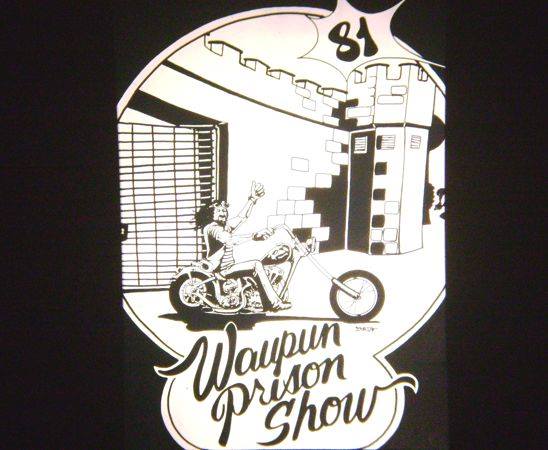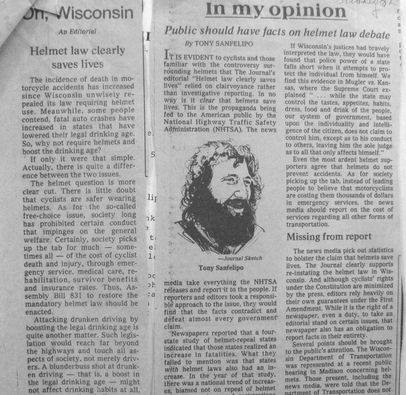By 1981, ABATE of Wisconsin was incorporated as a not-for-profit organization and we settled in for whatever new challenges would present themselves. It didn’t take long.
Anyway, the year started out with good news. Joan Claybrook, otherwise known as the “Dragon Lady,” who headed up the National Highway Traffic Safety Administration (NHTSA), was booted out of office by President Ronald Reagan. She was infamous for her special package of facts, a mixed bag of half-truths and misrepresentations she used to persuade states to maintain or reinstate mandatory helmet laws. What pissed the motorcyclist’s rights groups most was her opposition to motorcycle education. In her own twisted logic, she felt rider training would encourage more people to use motorcycles, therefore increasing the injury and fatality rate. Of course, we knew that helmets didn’t prevent crashes.
Nobody can claim this woman didn’t have chutzpah (that’s brass balls in Hebrew). Before being let go by Reagan, she sought a recall of between 10 and 20 million Ford cars and trucks. The recall was averted by Neil Goldschmidt, Secretary of Transportation. What did she do after leaving NHTSA? She applied for a job with the Ford Motor Company. For the record, she didn’t get the job.
Later in the year Representative Stephen Leopold introduced AB 831, titled “Motorcycles,” calling for the reinstatement of the mandatory helmet law in Wisconsin. Leopold represented the 26th Assembly District in Milwaukee. ABATE immediately launched a telephone campaign, jamming the legislative hotline number with the volume of calls. Three days after the phone campaign, members of ABATE in the Milwaukee region showed up at Leopold’s home on a Saturday morning to picket in front of his house. He was quite upset that we came to his home unannounced on a weekend. When asked about why he authored the bill, he simply said it was a free country. As a Vietnam veteran and a POW, we thought he would place more value on freedom. Later, the Milwaukee Journal complained we were insensitive in picketing Representative Leopold’s home on a weekend. So we did the right thing: We picketed the Journal offices in downtown Milwaukee. Don’t think legislators who were considering Leopold’s bill didn’t take notice of this activity. We were sure they didn’t want us showing up at their homes on a weekend. Yes, we were politically incorrect and proud of it.
After repeal of the helmet law in 1978, we learned that being “proactive” could help ward off new attempts at regulations and restrictions that affected us. Hence, we established a working relationship with our Wisconsin DOT in order to find solutions to reducing motorcycle crashes. We also practiced “reactive” procedures during the early years. Anytime something negative appeared, we reacted as soon as possible and with gusto, like the phone campaign and picket line after introduction of AB 831. Meanwhile, the media found an opportunity in the bill to exploit its stance on mandatory helmet laws. Although the media was always in conflict with us, it did afford us the chance to reply in the form of “In my opinion” editorials. ABATE business agent Tony “Pan” Sanfelipo wrote to Milwaukee Journal editorial page editor sig Gissler in response to a Journal editorial which proclaimed, “Helmet law clearly saves lives.” The editorial simplified the issue by saying cyclists were safer wearing helmets, but didn’t provide any statistical data to support these claims.
Tony Pan’s response was to accuse the Journal of clairvoyance, rather than facts, when claiming helmets saved lives. Relying on cherry-picked statistics from NHTSA, editors claimed states that repealed helmet laws saw an increase in fatalities. While true, what the paper didn’t say was states that maintained helmet laws also saw an increase in fatalities. There was also a comment made about the social burden, but the paper, while accusing motorcyclist’s injuries of causing a huge burden to tax payers, failed to mention the burden caused by all other forms of transportation injuries. What the paper also failed to mention was the fact that at the public hearing for AB 831, the Wisconsin DOT went on record as not supporting the bill. It was also reported at the hearing, which the media was present at, that Wisconsin experienced an increase in registrations after the repeal and the state actually had a 14% decrease in the fatality rate.
Prior to the public hearing on AB 831, Sanfelipo wrote to Highways Committee Chair Cletus Vanderperren. He told Vanderperren of a poll of Midwest Biker readers who overwhelmingly opposed the bill (Midwest Biker had a circulation of 10,000 readers). He also pointed out that cycle shops reported normal helmet sales and the helmet industry reported sales in excess of $80 million. He surmised that people who wore helmets before the repeal are still wearing them and the repeal didn’t effect anything other than the right to choose.
At the public hearing on the reinstatement bill, author Stephen Leopold spoke first, then abruptly left the room, seeming uninterested in what the opposition had to say. There were only a few who spoke in favor of the bill, including Dale Jenkins, a driver education teacher. The committee seemed to accept the testimony of the many who opposed the bill, and it ended there.
One little bit of nasty we had to deal with in 1981 was an attempt to rename the Waupun prison show. Education director George Smullens received a letter from ABATE president Dave Brunner on October 1, 1981. Brunner complained about the plan to name the show the “John Barajas Prison Show.” Naming the show after an individual was seen as a great injustice to the many people who worked to put this show together. Barajas was instrumental in creating the show, and worked closely with the staff at Waupun, but there was an exceptional amount of work done to invite individuals and clubs to participate, arrange camping facilities, transportation, set-up of band equipment and bringing guests like the number on nitro-fuel drag bike to the show, and more. Barajas had little to do with any of that. Brunner, speaking on behalf of ABATE of Wisconsin, stated that if the show continued as the John Barajas Prison Show, ABATE would withdraw. This situation caused a serious rift among the principal partners of this show. Hard feelings aside, the Waupun Prison Show sustained in 1982. Unfortunately, it was the last show, but not because of anything we did or anything that happened during the shows.




